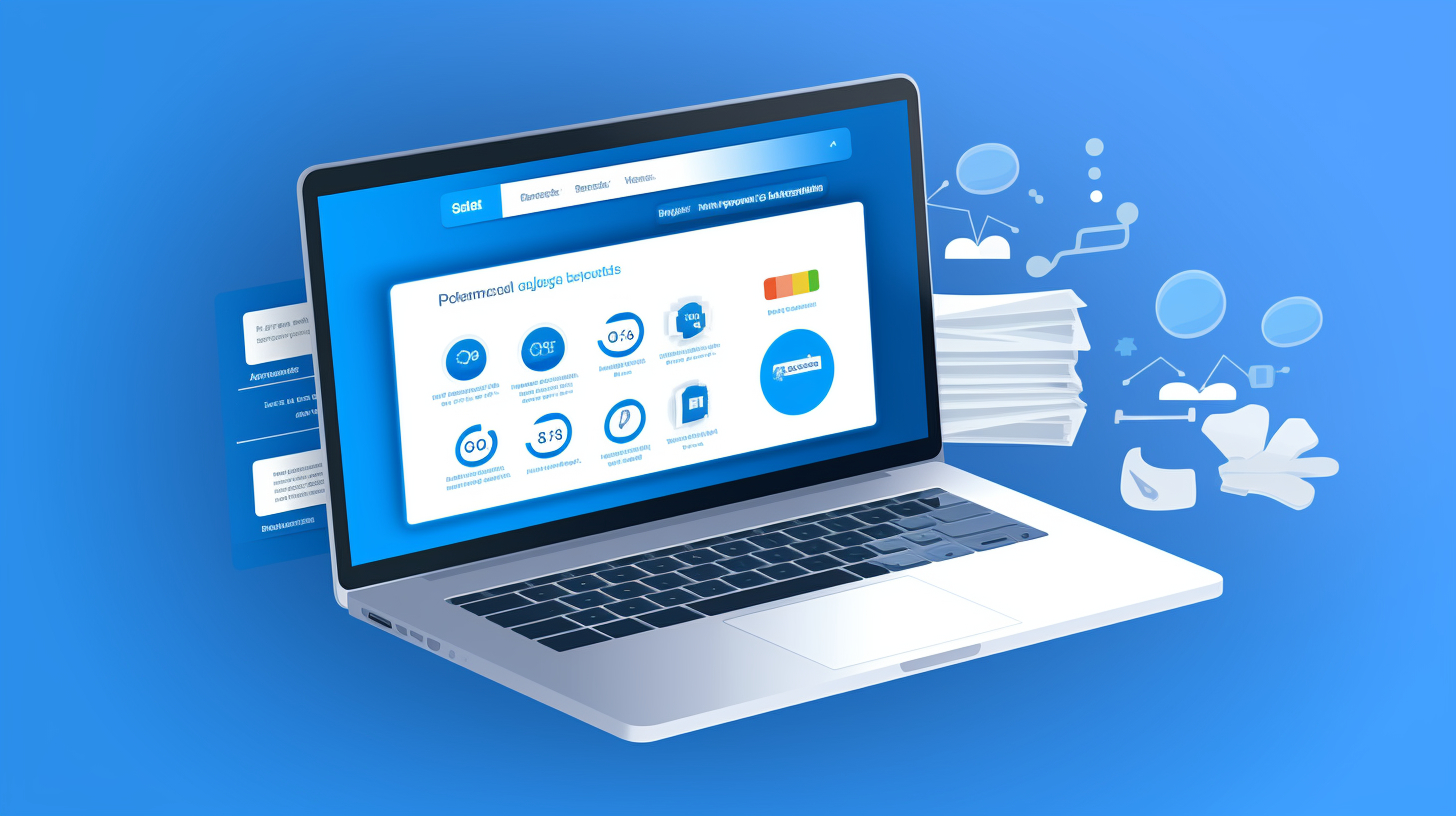歡迎來到WordPress SEO優化的世界!如果您是網站所有者或部落客,希望提高您在搜尋引擎結果頁面(SERP)上的排名,那麼您來對地方了。在本文中,我們將深入探討 WordPress 網站的頁面 SEO 優化領域,強調關鍵字優化、HTML 結構、語法等的重要性。我們還將討論選擇響應式和行動友善的 WordPress 主題的重要性,以及定期更新內容的好處。
眾所周知,擁有一個優化良好的網站對於推動自然流量和獲得搜尋引擎的知名度至關重要。雖然在 SEO 方面需要考慮很多方面,但頁面優化在決定搜尋引擎如何抓取和排名您的網站方面起著重要作用。
透過實施本文概述的最佳實踐和技術,您將能夠提高網站的知名度,吸引更廣泛的受眾,並最終在 SERP 上獲得更好的排名。那麼,讓我們開始探索 WordPress 頁面 SEO 優化的世界吧!但在我們深入研究具體的優化策略之前,必須先了解為什麼頁面 SEO 如此重要。
你可知道?根據 Backlinko 的一項研究,排名靠前的 Google 搜尋結果通常來自優化了頁面 SEO 元素的網站。因此,透過投入時間優化您的網站,您將更接近在搜尋引擎結果頁面上超越競爭對手。
頁面 WordPress SEO 優化
在當今競爭激烈的網路環境中,僅僅擁有一個漂亮的網站是不夠的。您需要優化網站的內容,以便搜尋引擎可以輕鬆發現它並吸引自然流量。用於建立網站的最受歡迎的內容管理系統之一是 WordPress,幸運的是,針對 SEO 優化您的 WordPress 網站比您想像的要容易。
HTML結構優化
確保您的網站的 HTML 結構得到最佳化對於頁面 SEO 至關重要。以下是需要考慮的幾個關鍵因素:
- 使用適當的標題標籤(H1,H2等)來邏輯地建立您的內容。這有助於搜尋引擎了解您的資訊的層次結構,並使讀者更容易瀏覽您的網頁。
- 優化您的元標籤,包括標題標籤和元描述,以準確描述每個頁面的內容。這些標籤出現在搜尋引擎結果中,並且可以極大地影響點擊率。
- 利用圖像 alt 標籤提供描述圖像內容的替代文字。這不僅可以幫助視障用戶了解您的網站,還可以為搜尋引擎提供有關您的內容的更多背景資訊。
關鍵字優化
關鍵字在 SEO 中起著至關重要的作用,針對關鍵字優化您的 WordPress 網站可以極大地提高您的搜尋引擎排名。以下是一些提示:
- 進行徹底的關鍵字研究,以確定與您的內容最相關且價值最高的關鍵字。 Google Keyword Planner 和 SEMrush 等工具可以幫助解決這個問題。
- 在您的內容中自然地融入您的目標關鍵字,包括標題、正文和圖像 alt 標籤中。但是,請避免關鍵字填充,因為它會對你的 SEO 工作產生負面影響。
- 撰寫引人入勝且高品質的內容以滿足用戶意圖。專注於為讀者提供價值,同時以自然、有機的方式整合相關關鍵字。
文法和可讀性
確保您的內容寫得好且易於閱讀,不僅可以改善用戶體驗,還可以向搜尋引擎表明您的網站提供了有價值且值得信賴的資訊。請考慮以下情況:
- 使用簡短而簡潔的句子以使您的內容易於理解。
- 將您的內容分成段落並利用項目符號和副標題來提高可讀性。
- 校對您的內容,檢查拼字和文法錯誤,並考慮使用 Grammarly 等工具來協助編輯。
架構標記
Schema 標記是一種結構化資料形式,可幫助搜尋引擎更好地理解您網站上的內容。實作架構標記可以增強您的搜尋引擎可見度並吸引更多目標流量。以下是使用架構標記來優化 WordPress 網站的方法:
- 在您的 WordPress 網站上安裝並啟動架構標記插件,例如 Schema Pro。
- 使用外掛程式將架構標記新增至相關內容元素,例如事件、產品、評論等。
- 使用 Google 的結構化資料測試工具測試您的架構標記,以確保其正確實施。
內部/外部鏈接
連結是頁面優化的一個重要方面。內部和外部連結都可以對您的 SEO 工作產生積極影響。以下是您需要了解的內容:
- 內部連結可協助搜尋引擎探索和了解您網站的結構。它還允許您將流量引導至您網站上的重要頁面。請務必使用為連結頁面提供上下文的描述性錨文本。
- 指向信譽良好且相關來源的外部連結可以提高內容的可信度和權威性。此外,外部連結可以幫助 Google 了解您的內容的上下文和主題。
總而言之,針對 SEO 優化您的 WordPress 網站涉及各種頁面任務,這些任務可以顯著提高您的搜尋引擎排名並增加自然流量。透過實施 HTML 結構優化、關鍵字優化、改進語法和可讀性、利用架構標記以及結合內部和外部連結策略,您可以提高 WordPress 網站的可見性和整體效能。
選擇響應式且適合行動裝置的 WordPress 主題
在當今數位時代,擁有一個適合行動裝置的網站至關重要。隨著越來越多的用戶透過智慧型手機和平板電腦造訪網站,確保您的 WordPress 主題具有響應能力並能適應不同的螢幕尺寸至關重要。但有這麼多的選擇,您如何為您的網站選擇合適的響應式且適合行動裝置的 WordPress 主題?讓我們深入探討一些需要考慮的重要因素。
1. 設計和佈局
在尋找一個響應式且適合行動裝置的 WordPress 主題時,首先要考慮的是它的設計和佈局。以下是一些需要記住的提示:
- 選擇具有簡潔且現代設計的主題。它應該具有視覺吸引力並且易於在桌面和行動裝置上瀏覽。
- 尋找提供自訂選項的主題。這將允許您定制設計以適合您的品牌和偏好。
- 注意選單、按鈕和圖像等元素的放置。確保它們易於存取且針對行動使用進行了最佳化。
2.響應式設計
響應式 WordPress 主題會自動調整您的網站佈局和設計以適應不同的螢幕尺寸。這對於在各種裝置上提供無縫的用戶體驗至關重要。選擇響應式主題時,請考慮以下幾點:
- 在不同的設備上測試主題以確保它在每種設備上看起來不錯並且運作良好。
- 檢查主題是否與 Chrome、Firefox 和 Safari 等主流網頁瀏覽器相容。
- 尋找使用流體網格和靈活影像來適應不同螢幕尺寸的主題。
3. 頁面速度和效能
頁面速度是影響使用者滿意度和網站排名的重要因素。網站加載緩慢可能會導致更高的跳出率並對您的 SEO 工作產生負面影響。選擇響應式且適合行動裝置的 WordPress 主題時,請注意其頁面速度和效能:
- 尋找針對速度和效能進行了最佳化的主題。
- 檢查主題是否使用乾淨且最佳化的程式碼。
- 考慮提供快取選項或支援流行快取外掛的主題以進一步提高頁面速度。
4. 與插件和擴充功能的兼容性
WordPress 提供各種外掛和擴展,可以增強您網站的功能和特性。在選擇主題之前,請確保它與您計劃使用的插件相容。這將防止任何相容性問題,並允許您毫不費力地向您的網站添加所需的功能。
5. 支持和更新
最後但同樣重要的一點是,考慮主題開發人員提供的支援和更新層級。尋找由積極維護和更新其產品的知名公司或個人開發的主題。定期更新可確保您的主題與最新的 WordPress 版本相容並提供最佳的安全性和效能。
請記住,選擇正確的響應式且適合行動裝置的 WordPress 主題對於創建在各種裝置上表現良好的用戶友好且視覺吸引力強的網站至關重要。花時間研究和測試不同的主題,以找到最適合您網站需求的主題。快樂的主題搜尋!
WordPress SEO 的關鍵字優化
您想讓您的 WordPress 網站在搜尋引擎結果頁面上排名更高嗎?當然可以!實現這一目標的最有效方法之一是透過關鍵字優化。透過在整個網站中策略性地使用關鍵字,您可以幫助搜尋引擎了解內容背後的意圖並提高其可見性。
關鍵字優化為何重要?
當使用者在線上搜尋資訊時,他們通常會輸入與他們所尋找的內容相關的特定單字或短語。這些單字或短語被稱為關鍵字。搜尋引擎分析網頁以確定其與使用者搜尋查詢的相關性。透過使用正確的關鍵字優化您的網站,您可以讓搜尋引擎更輕鬆地了解您的內容並將其與相關的搜尋查詢進行配對。
如何在WordPress中優化關鍵字?
WordPress 憑藉其用戶友好的介面和各種專為 SEO 目的設計的插件,讓關鍵字優化變得輕而易舉。以下是有效優化 WordPress 網站關鍵字的方法:
- 關鍵字研究: 首先進行徹底的關鍵字研究,以確定與您的內容最相關且效果最好的關鍵字。使用 Google Keyword Planner、SEMrush 或 Moz Keyword Explorer 等工具來尋找與您的主題相關且搜尋量較大的關鍵字。
- 頁面優化: 一旦有了關鍵字,就該優化你的內容了。以下是您應重點整合關鍵字的幾個關鍵領域:
- 標題標籤: 在您的頁面或部落格文章的標題標籤中包含您的目標關鍵字。這有助於搜尋引擎了解您的內容的重點。
- 標題和副標題: 在標題和副標題中使用關鍵字,讓搜尋引擎清楚地了解您的內容結構。
- URL 架構: 建立包含您的關鍵字的 SEO 友善 URL。例如,www.yourwebsite.com/keyword-optimization-wordpress。
- 元描述: 製作包含關鍵字的引人注目的元描述。雖然元描述不會直接影響排名,但它們會影響點擊率。
- 圖片替代文字: 使用相關關鍵字優化您的圖片替代文本,以提高圖片搜尋排名和可訪問性。
- 內容創作: 創造高品質、資訊豐富的內容,自然地融入您的目標關鍵字。避免關鍵字填充,因為這會對你的排名產生負面影響。專注於為您的受眾提供價值並以自然的方式使用關鍵字。
- 內部連結: 使用內容內的內部連結來連結相關頁面或部落格文章。這不僅有助於搜尋引擎了解您網站的結構,還可以改善用戶體驗。
- 監控與分析: 使用 Google Analytics 或 WordPress SEO 外掛程式等工具定期監控您網站的效能。注意那些為您的網站帶來流量的關鍵字,並相應地調整您的策略。
透過實施這些關鍵字優化技術,您可以顯著提高您的WordPress網站的可見度並增加來自搜尋引擎的自然流量。請記住,SEO 是一個持續的過程,因此請持續監控和改進您的關鍵字策略,以保持競爭優勢。祝您優化愉快!
定期更新內容
在搜尋引擎結果中獲得更好排名的最重要因素之一是定期更新網站內容。新鮮、相關且更新的內容向搜尋引擎表明您的網站活躍且為用戶提供價值。這就是為什麼定期更新內容對於 WordPress SEO 優化至關重要:
- 改進索引:當您定期更新您的網站時,搜尋引擎爬蟲會更頻繁地訪問您的網站,從而更快地對您的新內容進行索引和排名。這可以幫助您的網站在搜尋結果中排名更高。
- 增加有機流量:新鮮的內容會從搜尋引擎吸引更多的自然流量。透過定期發布新文章、部落格貼文或其他有價值的內容,您更有機會對相關關鍵字進行排名並吸引更多的受眾造訪您的網站。
- 更高的用戶參與度:更新您的內容可讓您的網站保持吸引力並與訪客息息相關。當用戶在您的網站上找到有價值且最新的資訊時,他們更有可能停留更長時間,瀏覽更多頁面並與您的內容互動,這可能會帶來更高的轉換率。
- 關鍵字優化的機會:定期更新您的內容為您提供了整合與您的行業或利基相關的目標關鍵字的機會。透過針對相關關鍵字策略性地優化您的內容,您可以增加在特定搜尋查詢的搜尋引擎結果中排名更高的機會。
為了確保持續更新內容,請考慮以下提示:
- 創建一個 編輯日曆 規劃和安排定期的內容更新。
- 重新利用 透過更新和擴展先前的文章或部落格文章來創建您現有的內容。
- 邀請客座部落客或 合作 與行業專家一起提供新的觀點和見解。
- 透過以下方式與觀眾互動 評論 並在內容更新中解答他們的疑問或擔憂。
請記住,定期更新您的網站內容是一個持續的過程。透過保持積極主動並保持內容新鮮,您可以改善 WordPress SEO 優化並為您的網站吸引更多自然流量。
了解更多關於 WordPress SEO 優化的資訊以及 Managed-WP™ 如何幫助您獲得更好的排名。訪問 託管WP 今天。
常見問題解答
- 什麼是WordPress SEO優化?
WordPress SEO 優化是指透過實施各種技術、策略和外掛程式來幫助優化您網站的內容、結構和元標記,從而提高您網站的搜尋引擎排名和可見性的過程。
- 哪個 SEO 外掛最適合 WordPress?
WordPress 的最佳 SEO 外掛是主觀的,取決於您的特定需求。然而,受歡迎的選項包括 Yoast SEO、All in One SEO Pack 和 Rank Math,因為它們提供了一系列強大的功能並且擁有出色的用戶評分。
- 一些基本的 WordPress SEO 實踐是什麼?
一些基本的 WordPress SEO 實踐包括關鍵字研究、優化元標籤和標題、創建高品質且引人入勝的內容、提高網站加載速度、利用內部和外部連結以及確保行動響應能力。
- WordPress SEO 優化如何提升我的排名?
WordPress SEO 優化可使您的網站更易於搜尋引擎訪問、優化關鍵字使用和相關性、增強用戶體驗、提高網站速度以及生成高品質的反向鏈接,從而幫助提高您的排名。
- 有沒有與 WordPress 整合的 SEO 工具?
是的,許多 WordPress 的 SEO 外掛程式都附有整合工具,可協助進行關鍵字研究、頁面優化、XML 網站地圖產生、Google Analytics 整合等。這些工具可以大大增強您的整體 SEO 效果。



















